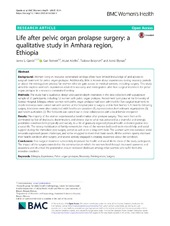| dc.contributor.author | Gjerde, Janne Lillelid | en_US |
| dc.contributor.author | Rørtveit, Guri | en_US |
| dc.contributor.author | Adefris, Mulat | en_US |
| dc.contributor.author | Belayneh, Tadesse | en_US |
| dc.contributor.author | Blystad, Astrid | en_US |
| dc.date.accessioned | 2018-10-19T08:10:48Z | |
| dc.date.available | 2018-10-19T08:10:48Z | |
| dc.date.issued | 2018-05-29 | |
| dc.identifier.issn | 1472-6874 | |
| dc.identifier.uri | https://hdl.handle.net/1956/18650 | |
| dc.description.abstract | Background: Women living in resource constrained settings often have limited knowledge of and access to surgical treatment for pelvic organ prolapse. Additionally, little is known about experiences during recovery periods or about the reintegration process for women who do gain access to medical services, including surgery. This study aimed to explore women’s experiences related to recovery and reintegration after free surgical treatment for pelvic organ prolapse in a resource-constrained setting. Methods: The study had a qualitative design and used in-depth interviews in the data collection with a purposive sample of 25 participants, including 12 women with pelvic organ prolapse. Recruitment took place at the University of Gondar Hospital, Ethiopia, where women with pelvic organ prolapse had been admitted for free surgical treatment. Indepth interviews were carried out with women at the hospital prior to surgery and in their homes 5–9 months following surgery. Interviews were also conducted with health-care providers (8), representatives from relevant organizations (3), and health authorities (2). The fieldwork was carried out in close collaboration with a local female interpreter. Results: The majority of the women experienced a transformation after prolapse surgery. They went from a life dominated by fear of disclosure, discrimination, and divorce due to what was perceived as a shameful and strongly prohibitive condition both physically and socially, to a life of gradually regained physical health and reintegration into a social life. The strong mobilization of family-networks for most of the women facilitated work-related help and social support during the immediate post-surgery period as well as on a long-term basis. The women with less extensive social networks expressed greater challenges, and some struggled to meet their basic needs. All the women openly disclosed their health condition after surgery, and several actively engaged in creating awareness about the condition. Conclusions: Free surgical treatment substantially improved the health and social life for most of the study participants. The impact of the surgery extended to the communities in which the women lived through increased openness and awareness and thus had the potential to ensure increased disclosure among other women who suffer from this treatable condition. | en_US |
| dc.language.iso | eng | eng |
| dc.publisher | BioMed Central | eng |
| dc.relation.ispartof | <a href="http://hdl.handle.net/1956/18651" target="blank"> Chronic disease among women in a resource-constrained setting. The case of pelvic organ prolapse in rural Ethiopia</a> | |
| dc.rights | Attribution CC BY | eng |
| dc.rights.uri | http://creativecommons.org/licenses/by/4.0/ | eng |
| dc.subject | Ethiopia | eng |
| dc.subject | Experience | eng |
| dc.subject | Pelvic organ prolapse | eng |
| dc.subject | Recovery | eng |
| dc.subject | Reintegration | eng |
| dc.subject | Surgery | eng |
| dc.title | Life after pelvic organ prolapse surgery: a qualitative study in Amhara region, Ethiopia | en_US |
| dc.type | Peer reviewed | |
| dc.type | Journal article | |
| dc.description.version | publishedVersion | en_US |
| dc.rights.holder | Copyright 2018 The Authors | |
| dc.source.articlenumber | 74 | |
| dc.identifier.doi | https://doi.org/10.1186/s12905-018-0568-2 | |
| dc.identifier.cristin | 1593480 | |
| dc.source.journal | BMC Women's Health | |
| dc.source.40 | 18 | |

